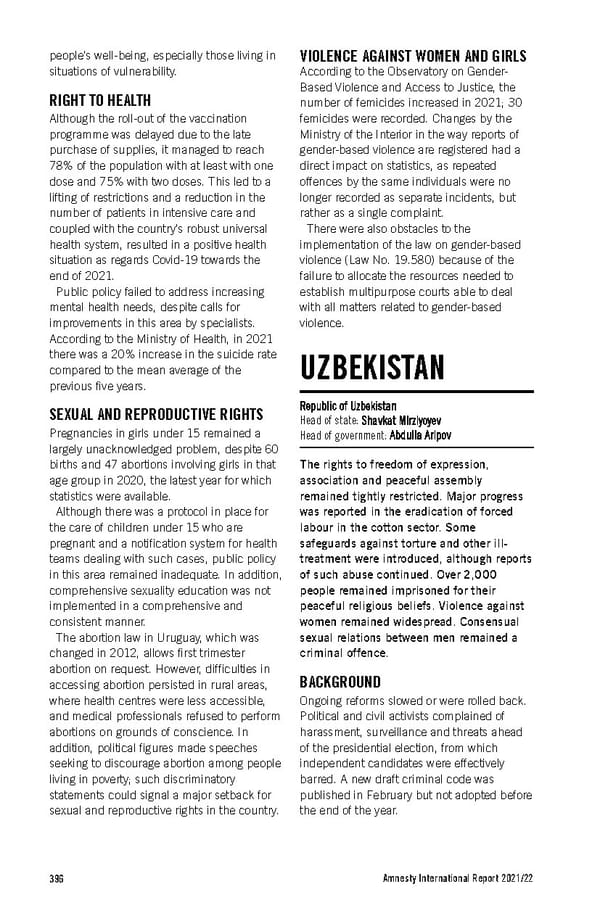people’s well-being, especially those living in VIOLENCE AGAINST WOMEN AND GIRLS situations of vulnerability. According to the Observatory on Gender- RIGHT TO HEALTH Based Violence and Access to Justice, the number of femicides increased in 2021; 30 Although the roll-out of the vaccination femicides were recorded. Changes by the programme was delayed due to the late Ministry of the Interior in the way reports of purchase of supplies, it managed to reach gender-based violence are registered had a 78% of the population with at least with one direct impact on statistics, as repeated dose and 75% with two doses. This led to a offences by the same individuals were no lifting of restrictions and a reduction in the longer recorded as separate incidents, but number of patients in intensive care and rather as a single complaint. coupled with the country’s robust universal There were also obstacles to the health system, resulted in a positive health implementation of the law on gender-based situation as regards Covid-19 towards the violence (Law No. 19.580) because of the end of 2021. failure to allocate the resources needed to Public policy failed to address increasing establish multipurpose courts able to deal mental health needs, despite calls for with all matters related to gender-based improvements in this area by specialists. violence. According to the Ministry of Health, in 2021 there was a 20% increase in the suicide rate compared to the mean average of the UZBEKISTAN previous five years. SEXUAL AND REPRODUCTIVE RIGHTS Republic of Uzbekistan Head of state: Shavkat Mirziyoyev Pregnancies in girls under 15 remained a Head of government: Abdulla Aripov largely unacknowledged problem, despite 60 births and 47 abortions involving girls in that The rights to freedom of expression, age group in 2020, the latest year for which association and peaceful assembly statistics were available. remained tightly restricted. Major progress Although there was a protocol in place for was reported in the eradication of forced the care of children under 15 who are labour in the cotton sector. Some pregnant and a notification system for health safeguards against torture and other ill- teams dealing with such cases, public policy treatment were introduced, although reports in this area remained inadequate. In addition, of such abuse continued. Over 2,000 comprehensive sexuality education was not people remained imprisoned for their implemented in a comprehensive and peaceful religious beliefs. Violence against consistent manner. women remained widespread. Consensual The abortion law in Uruguay, which was sexual relations between men remained a changed in 2012, allows first trimester criminal offence. abortion on request. However, difficulties in BACKGROUND accessing abortion persisted in rural areas, where health centres were less accessible, Ongoing reforms slowed or were rolled back. and medical professionals refused to perform Political and civil activists complained of abortions on grounds of conscience. In harassment, surveillance and threats ahead addition, political figures made speeches of the presidential election, from which seeking to discourage abortion among people independent candidates were effectively living in poverty; such discriminatory barred. A new draft criminal code was statements could signal a major setback for published in February but not adopted before sexual and reproductive rights in the country. the end of the year. Amnesty International Report 2021/22 396
 Amnesty International Report 2021/22 Page 395 Page 397
Amnesty International Report 2021/22 Page 395 Page 397